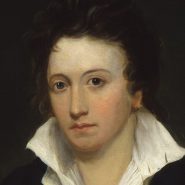Childe Harold’s Pilgrimage (Canto III — Selected Excerpts)
Exile becomes self-fashioning in Byron’s Canto III, where Spenserian stanzas join spectacle to inward pilgrimage.
Don Juan (Canto I — Selected Excerpts)
In witty ottava rima, Byron’s “Don Juan” swaps epic heroics for satire — a comic anatomy of desire and hypocrisy.
Darkness
An apocalyptic lyric from 1816, “Darkness” imagines a sunless world — grandeur without comfort, entropy without appeal.
So, We’ll Go No More a Roving
A tender farewell to excess, Byron’s lyric accepts time’s limits so that love may last.
Paradise Lost (Selected Excerpts)
Milton’s epic of the Fall explores freedom and obedience in sweeping blank verse — theology unfolding as dramatic action.
Lycidas (Selected Excerpts)
Milton’s pastoral elegy blends classical rite and Christian prophecy, turning grief into renewed vocation.
On His Blindness (Sonnet XIX)
Milton’s Sonnet XIX reframes vocation through patience: “They also serve who only stand and wait.”
L’Allegro (Selected Excerpts)
Milton’s ode to mirth celebrates festivity as a disciplined joy — pastoral song and theater shaping perception and virtue.
Il Penseroso (Selected Excerpts)
Milton’s companion ode to contemplation praises learned solitude, ritual, and vision as a humane counterbalance to mirth.
Song of Myself (Selected Excerpts)
Whitman’s “Song of Myself” makes a democratic, embodied lyric — a capacious voice that invites contradiction and communion.
I Hear America Singing
An anthem of labor and individuality, “I Hear America Singing” gathers many voices into one democratic chorus.
O Captain! My Captain!
Whitman’s elegy for Lincoln balances public exultation with private grief in a rare, formally rhymed lament.
